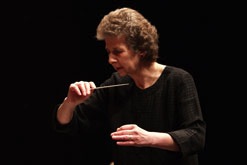The Cincinnati Symphony Orchestra and May Festival Chorus brought
Handel’s “Messiah” to Music Hall Sunday afternoon. And what a gift it was for the holiday season.

I doubt a more expressive performance of his great oratorio has ever been heard in Cincinnati, certainly not by this reviewer.
Making it happen was guest conductor Jane Glover. Contrary to “Messiahs” handed down from the overblown British tradition, hers was a close, intimate reading according to period performance practice, and the reduced, 60-member Chorus, which is directed by Robert Porco, sang it with rare clarity and expression.
Glover, music director of Music of the Baroque in Chicago and director of opera at London’s Royal Academy of Music, is a world-renowned conductor of baroque-era music (and Mozart). It was her CSO debut -- and her return to the orchestra cannot come soon enough. Glover led the nearly two-hour work (almost complete, with a few strategic cuts) entirely from memory and with a passion and commitment that communicated itself powerfully.
The CSO numbered 28 players, plus keyboardist Heather MacPhail on harpsichord and organ, making for a lithe ensemble lacking nothing in skill and responsiveness. The soloists, soprano Arianna Zukerman, mezzo-soprano Phyllis Pancella, tenor Nicholas Phan and bass Kevin Burdette, were a well-matched ensemble, with trim, agile voices.
The aura of the work was apparent from the opening Sinfonia. Marked “Grave” -- meaning “serious” but sometimes equated with slow -- it moved lightly and swiftly, preparing the scene for Phan’s tender “Comfort Ye” and nimble “ “Ev’ry Valley.”
Burdette made a fine impression early on with his recitative “Thus saith the Lord . . . I will shake the heav’ns and the earth,” delivered with notable flexibility. Pancella owned the most beautiful voice of the four, dark and smoldering, but without heaviness, as she demonstrated in her aria “But who may abide.” She and Zukerman conjured peace itself in their duo aria “He shall feed his flock,” while Zukerman put lots of joy in the florid “Rejoice greatly, O daughter of Zion.”
Above all, what was striking about this “Messiah” was its emphasis on text and affect. One felt peace, joy, sorrow, anger -- whatever the words called for at any particular moment. In part I, for example, Glover underlined the word “Wonderful” in the chorus “For unto us a child is born,” followed immediately by a serene, scene-setting “Pastoral Symphony.” The chorus “Glory to God in the highest” had an exuberant, burnished quality, not alone attributable to the trumpets in the balcony (Robert Sullivan and Steven Pride).
A torrent of feeling built up in part II. The chorus “Behold the Lamb of God” was gentle, though laden with sorrow, creating an almost supernatural effect, echoed by Pancella in her aria “He was despised.” The Chorus expressed indignation in “Surely, He hath borne our grief” and “All we like sheep,” where Glover drew out the words, “like sheep” like a reprimand. Continuing the cascade of emotions, there was shocked silence in “And the Lord hath laid on him.” This became mockery in “He trusted in God,” sung in something like street gang voices. Similarly, “if He delight in Him!” was pointed and hard, and Phan upped the pitch to anger itself in “He was cut off out of the land of the living.”
The women’s voices grew insistent in “Lift up your heads,” with their repeated “Who is the King of Glory?” There was lots of buzz in “Why do the nations so furiously rage together,” with its tremolo strings, and Phan was equally emphatic in his aria, “Thou shalt break them with a rod of iron.” The latter led into the most stirring “Hallelujah” this reviewer has ever heard. The audience rose to their feet (and some sang along), as is the custom.
Zukerman’s “I Know that my redeemer liveth,” beginning part III was a bit tepid considering the depth of feeling that went before, but Burdette’s “The Trumpet shall sound” more than made up for it, with lots of help from Sullivan, who put extra flourish into his trumpeting, for a truly exhilarating effect.
It was the Chorus’ part from then on, with a triumphant “Worthy is the Lamb,” which was as joyful and thrilling as “Hallelujah.” They began “Amen,” ever so softly, building to a splendid conclusion and again drawing the crowd to their feet.